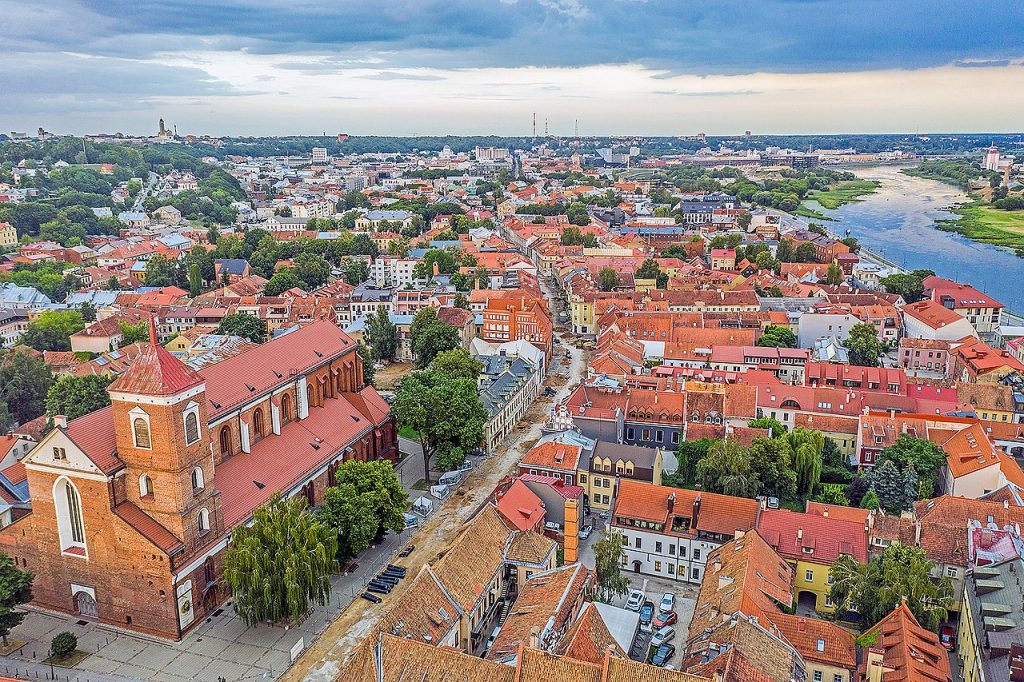
Nothing of the Jewish presence in Kaunas remains but the synagogue, whereas before the war there was a yeshiva, a kosher slaughterhouse, and a prison. The birthplace of Emmanuel Levinas, Kaunas was before the Shoah a major center of European Judaism, with a population of 40,000 Jews. The large yeshiva of Slobodka was located in a suburban district today called Vilijampole.
The Jewish presence in the city of Kaunas dates back to at least the 16th century. They worked there but were expelled from the city, notably by decisions in 1682, 1753 and 1761, until their presence stabilised at the end of the 18th century. When they were officially readmitted in 1782.
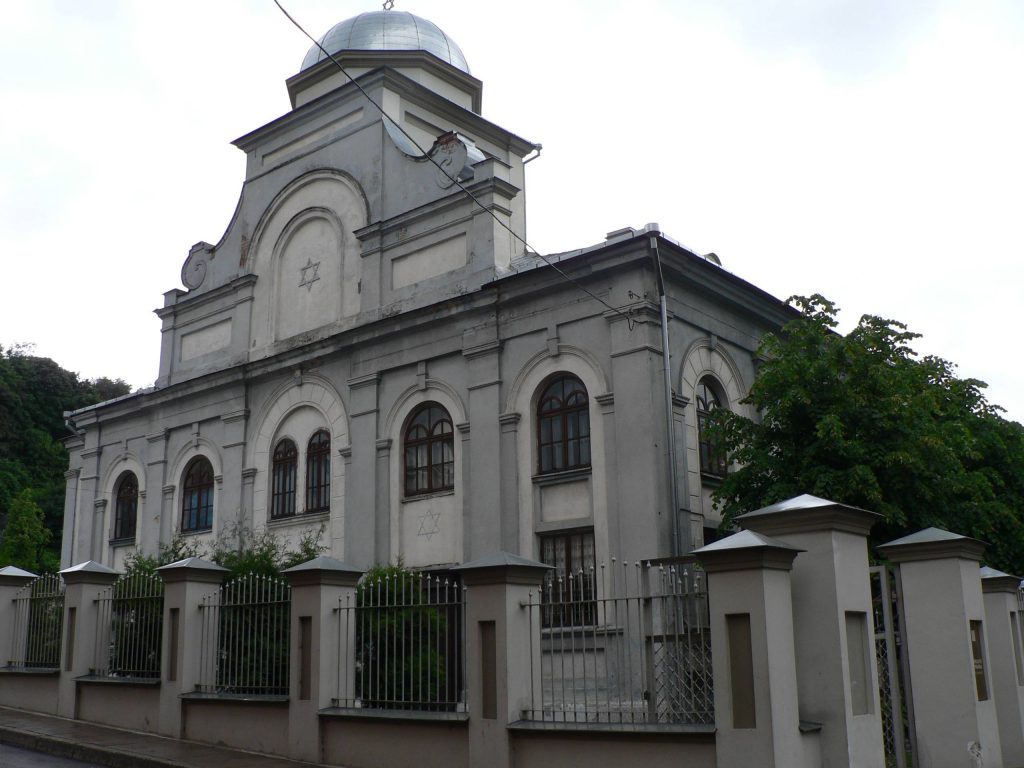
Kaunas became part of Russia after the partition of Poland in 1795. The Jewish population increased over the century. It increased from 2,000 in Kaunas and Slobodka in 1847 to more than 25,000 at the end of the century. This was accompanied by a great Jewish cultural development. Numerous yeshivoth were established, including Or Hayim, Knesset Beth Yitshak and Knesset Israel.
The synagogue features a blue, two-story classical facade and is located at 11 Ozheshkienes Street. The Jewish orphanage and the Jewish school were closed in 1951.

In 1908, 32628 Jews were registered in Kaunas, which constituted almost 40% of the total population. When Lithuania became independent during the inter-war period, the Jewish population continued to grow. Thus, there were no less than five newspapers on Jewish culture.
During the Holocaust, large numbers of Jews were victims of both violent disenfranchisement and local pogroms. In 1941, tens of thousands of Jews were locked up in the country’s ghettos. These ghettos ‘took in’ tens of thousands of other Jews transferred by the Nazis from other parts of Europe.
The ghettos were transformed into death camps. Many Jews took part in the Resistance, joining the maquis in the nearby forests. Shortly before the entry of the Russian troops, the Nazis accelerated the massacres. The vast majority of Lithuanian Jews were massacred during the Holocaust.
Faced with this situation, one man represented courage at the highest level, Chiune Sugihara. The Japanese diplomat saved 6000 European Jews by granting them visas.
Chiune Sugihara
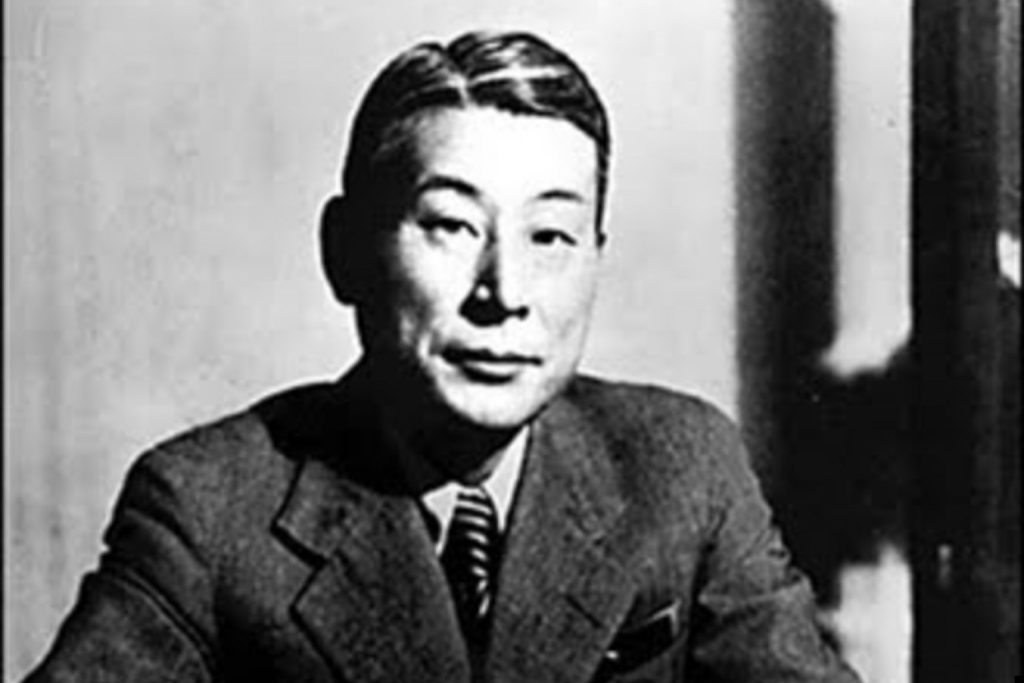
Based in Kaunas, Chiune Sugihara (1900-1986) was the first consul of Japan in Lithuania for a few months between 1939 and 1940. Between 31 July and 1 September 1940, Sugihara and one of his colleagues from the Netherlands saved about 6000 Jews by issuing visas, against the orders from their superiors, to let them out of the country. Sugihara stamped visas until the very moment his train was leaving Kaunas for Berlin, even throwing his stamp from his window who continued in issuing visas.
This heroic action ended the consul’s career and his life was obviously threatened. A lot of the Jews saved by Sugihara established themselves in Israel and since then honored his action, and at his death, the consul’s memory. You can visit Sugihara’s house, now transformed into a museum which retraces the destiny of this diplomat.
After the Shoah, many of the survivors made aliyah. Thus, in 1959, the town had less than 5,000 Jews. A synagogue and a Yiddish theatre group were the main Jewish cultural attractions in the 1960s.
Following the end of the USSR and the independence of Lithuania at the turn of the 1990s, about 500 Jews lived in the city.
In 2018, Japanese Prime Minister Shinzo Abe visited the museum dedicated to Chiune Sugihara which is located in the building that housed the consulate during the war. He said during the visit that “the whole world appreciated the courageous humanitarian act of Mr Sugihara, who worked with conviction and passion. He is a pride for the Japanese people.
In 2021, the city of Jerusalem inaugurated a square in honour of Sugihara in the Kiryath Yovel neighbourhood. His son, Nobuki Sugihara, participated in the ceremony. He himself had studied at the University of Jerusalem in the late 1960s and lived in the neighbourhood at the time. He said at the ceremony that he was moved to see the many descendants of people saved by his father. The Mayor of Jerusalem, Moshe Lion, also attended the event.
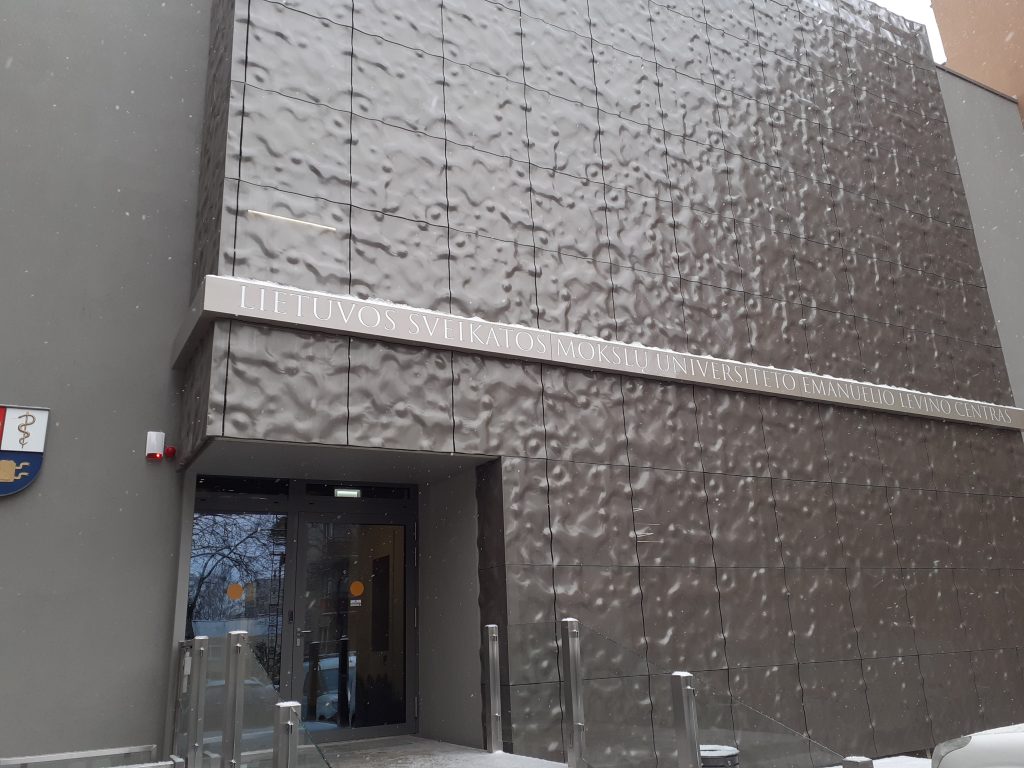
At the end of 2021, the Emmanuel Levinas Center was inaugurated in Kaunas. Salomon Malka, journalist and author of various books dedicated to the philosopher born in this city, participated in this event marking a willingness of the local authorities to highlight the Jewish cultural heritage.
Report by Salomon Malka : Kaunas 2022, the promise of dawn
Visas for life is the story of Sugihara, a Japanese vice-consul in Kaunas at the beginning of the Second World War. Before the pandemic, there were a majority of Japanese tourists, a good number of Israelis and students from the city’s schools, says the young guide who shows us around. The pandemic has reduced the number of tourists, and the museum is in a difficult financial situation.
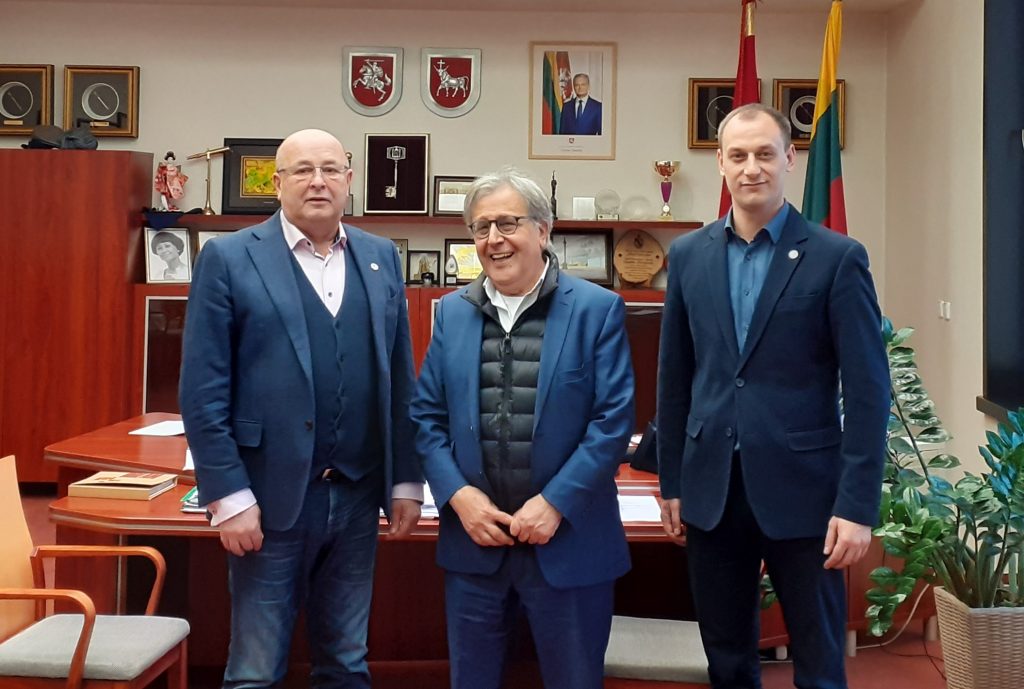
The history of Sugihara is little known. We knew who Oskar Schindler was, thanks to Steven Spielberg’s film. But fewer people had heard of Sugihara, the elegant and courageous diplomat who saved the lives of thousands of Jews and was Japan’s first consul in Lithuania. His fame was short but intense, spanning a few months between 1939 and 1940.
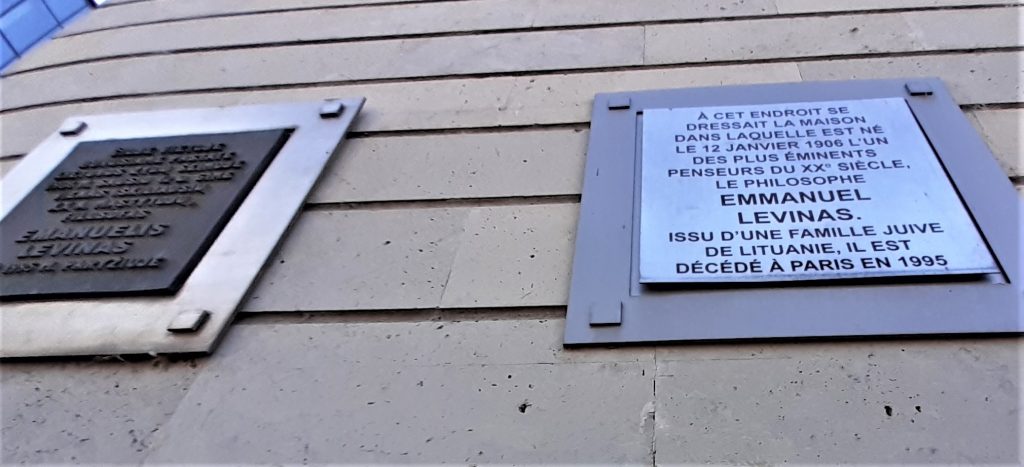
There were two of them at the beginning, and it all started with Jewish refugees from Poland contacting Zwartendijk, the new Dutch consul, who immediately agreed to issue transit visas for the Caribbean island of Curaçao. The Dutchman then approached his Japanese colleague who started doing the same thing from his office, and when that same office was closed by his government authorities, he moved to the Metropolis Hotel and continued to issue passes until the last day of his departure from Lithuania, against the advice of his superiors. Anecdotally, he even threw his stamp out of the window of a train that was to take him out of the country. Together with Zwartendijk, they managed to issue at least 10,000 visas.
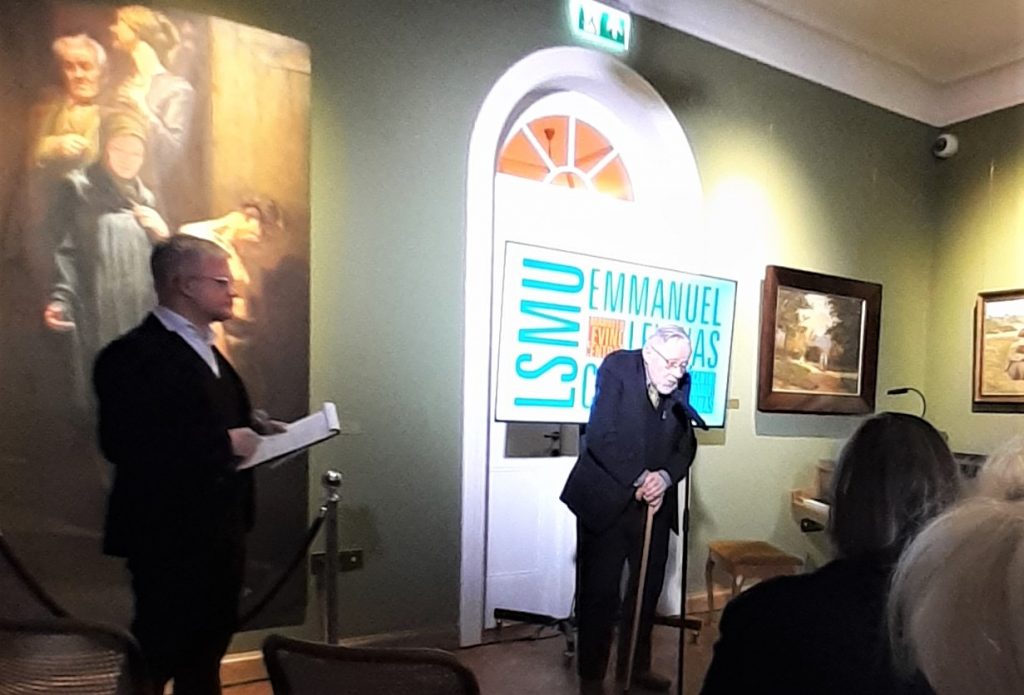
The house we visit, transformed into a museum in the district of Zaliakalnis, tells the story of this unusual diplomat, who will be distinguished as “Righteous of the Nations” by the Yad Vashem Institute.
Some of the Jews saved by Sugihara ended up in the United States, and many of them in Israel, among them the former Minister of Culture Zarah Warhafteg, whose portraits can be found on the walls.
For a long time, the Japanese diplomat kept this story secret. It was not until the 1960s that the first testimonies began to appear.
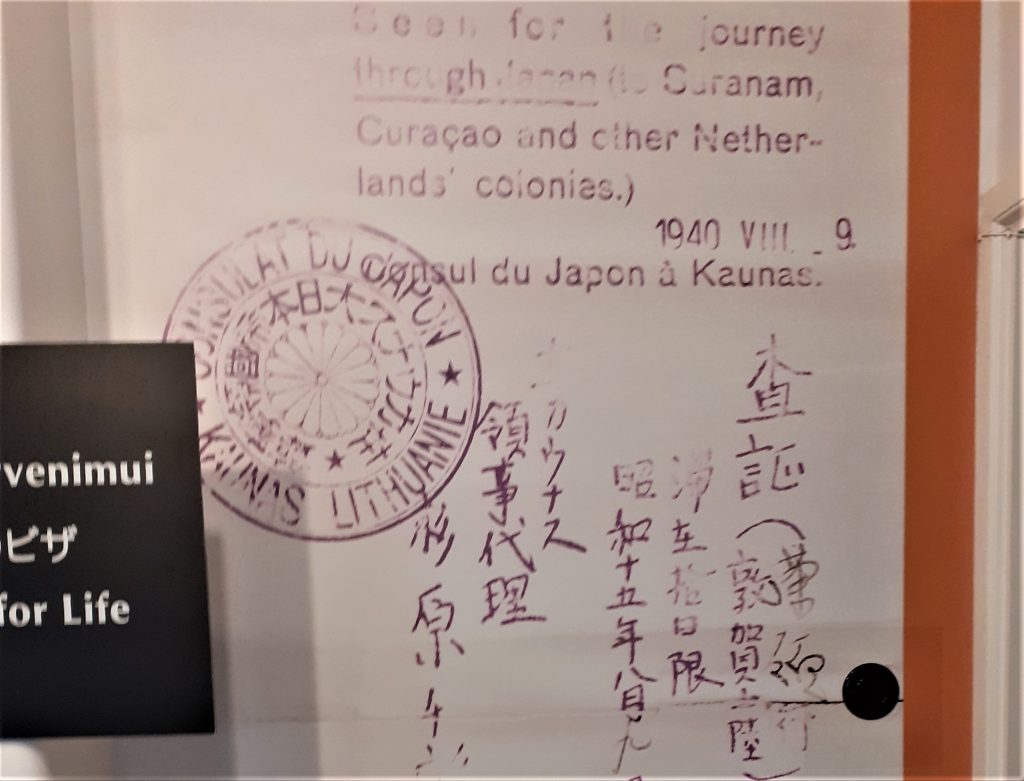
The Ohel Jacob Synagogue is one of the few religious buildings to have been preserved in Kaunas, and one of the last to remain in use. Its dome was damaged during the war and it was only in 2001 that it was restored. We visit this synagogue, which is now the religious and cultural centre of the Jewish community, with the leader Mausha Beirakat and his son. Built in 1871 thanks to the personal financing of a rich merchant from the city, Lewin Minkovski, it is classically built on two floors.
On the second floor, the walls display an impressive collection of paintings reproducing portraits of rabbis who have followed one another over the years, based on photographs. From the Gaon of Vilna to the great figures of the prestigious yeshiva of Slobodka – it used to be located in a suburban district now called Vilijampole -, these portraits are the work of a friend of our host, a Belgian from Antwerp, non-Jewish, who undertook to paint all the local glories lying along the walls and which tell the fabulous, intellectual and spiritual history of the city of Kovno. At the entrance to the synagogue, a mural tribute is paid to the soldiers who fell before independence in 1989, another is erected as a monument to the soldiers who fell in the First World War.
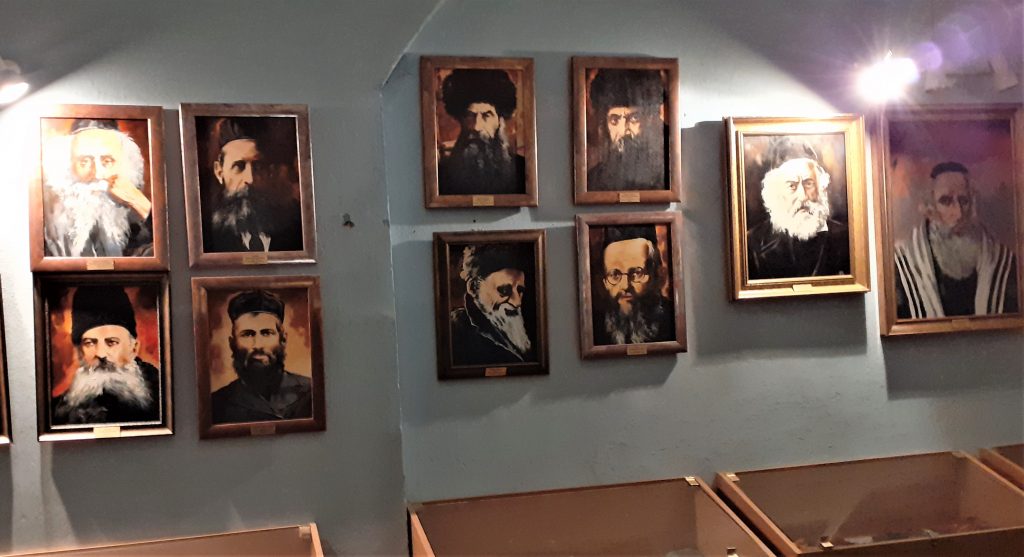
Dressed in a large black skullcap, not a little proud of his paintings, Mausha Beirakat offers us tea in his office while his son takes up the piano to play Chopin and Debussy.
We think about the fact that the synagogue was used as a warehouse by the Nazis during the war, and that it is perhaps for this reason that it has been preserved while a good part of the synagogues have been destroyed. It must be said that before the war, Kovno had 40,000 Jews and 25 active synagogues, of which only this last testimony remains.
The former President of the Republic, Wytautas Landsbergis, paid a fine tribute to the inauguration of the Emmanuel Levinas Centre in the heart of Kaunas, under the auspices of the Faculty of Medicine. The speaker did not shy away from the dark hours, and in particular the assassination, on their doorstep, of members of the philosopher’s family, his father, his mother, his two brothers Boris and Aminadab.
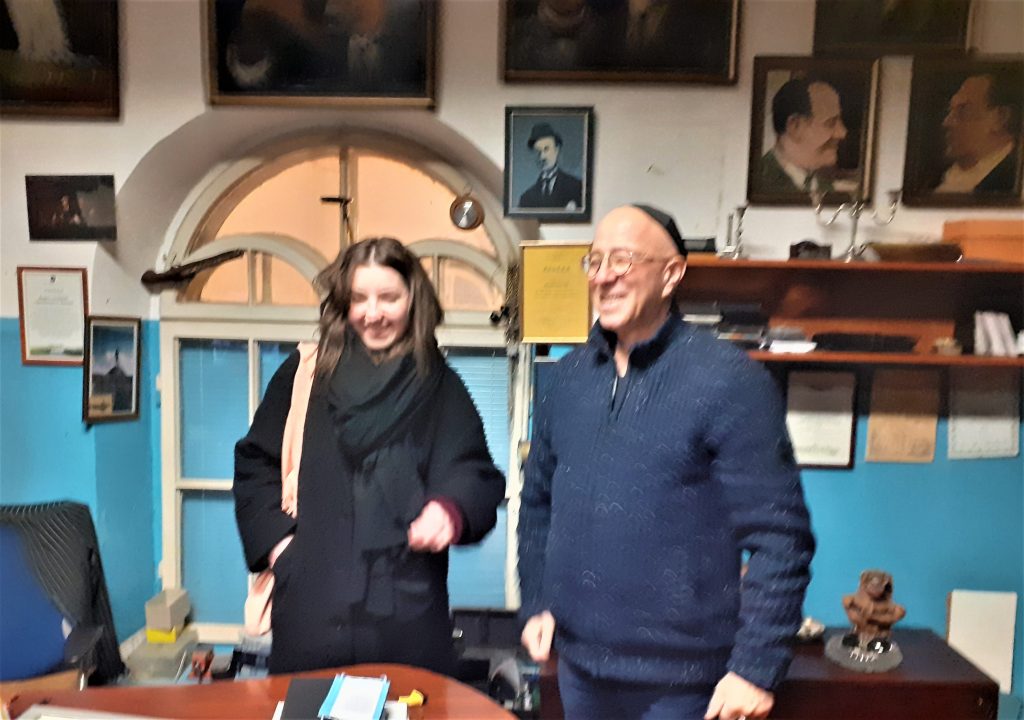
The grandson, David Hansel, recalls that Landsbergis’ mother saved Levinas’ cousin, who had been his classmate at the university, which earned her the distinction of the Yad Vashem Institute in Jerusalem. “One can say that the Litwaks are the honour of Lithuania,” the former President said. To which the Chief Rabbi of France, Haïm Korsia, who was present with a video message, replied: “I want to tell you how proud French Judaism is, after the 350th anniversary of the Gaon of Vilna, which was also celebrated by Lithuania.
Among the great figures honoured by the Lithuanians, another illustrious writer, not from Kaunas but from Vilnius, is Romain Gary. All his works have been translated into Lithuanian. There is a street named after him in Vilnius. A monument has been erected on the corner of the street where he lived as a child, depicting a child looking up at the sky, taken from an autobiographical scene in which he recalls his mother – a wonderful mother figure who continued to send him letters at the front even though she was no longer with us. He would say of her, only half-jokingly, “My mother is the first General de Gaulle I ever met! The book is called Promise at Dawn.
With these two names, Levinas and Gary, Lithuania is ready for 2022, the year in which the city of Kaunas is named European Capital of Culture.